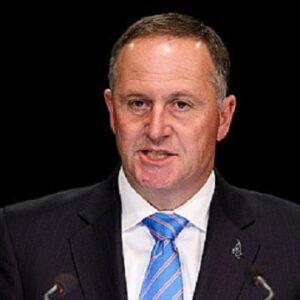New Zealand’s current Prime Minister, John Phillip Key, took office in 2008. He has also served as the Leader of the New Zealand National Party since November 2006. When he initially became Prime Minister in 2008, the world economy was in the throes of a worldwide recession, he promptly implemented changes to help New Zealand’s economy recover. After a big earthquake rocked Christchurch, New Zealand’s second largest city, in 2011, another major financial crisis ensued, severely impacting the country’s economy. He once again demonstrated his ability as a great national leader by guiding his country through terrible economic times. His outstanding leadership qualities earned him widespread acclaim, and he was re-elected to a second term as Prime Minister. John Key, who began his career as an auditor, has always aspired to be Prime Minister. Later in life, he worked as a foreign exchange dealer before becoming a successful investment banker. He first entered politics as a member of the New Zealand Parliament, quickly rising through the ranks to become the National Party’s leader in 2006. He was elected Prime Minister of New Zealand a few years later after becoming a very popular politician.
Childhood and Adolescence
On August 9, 1961, in Auckland, New Zealand, he was born to George and Ruth Key. His father was an English immigrant and a World War II veteran, while his mother was an Austrian Jewish immigrant. He is the younger of two sisters.
He attended Aorangi School and Burnside High School for his basic education before enrolling at the University of Canterbury, where he got a Bachelor of Commerce degree in accounting in 1981.
Career of John
In 1982, he got his first work as an auditor at McCulloch Menzies, after finishing his education. After a while, he was hired as a project manager at Lane Walker Rudkin, a garment company based in Christchurch.
He worked for the clothes company for two years before switching careers once more. He landed a job as a foreign exchange dealer at Elders Finance in Wellington, which he enjoyed.
He was a hard worker with a lot of ambition, and he quickly advanced through the ranks to become the top foreign exchange trader. The Auckland-based Bankers Trust appointed him in 1988.
He had a huge success in his career, and in 1995 he joined Merrill Lynch in Singapore as the head of Asian foreign exchange. He was elevated to Merrill Lynch’s global head of foreign exchange in London within a year. He also took Harvard University’s management studies courses.
By the late 1990s, he had developed a strong interest in politics. When the National Party’s president, John Slater, learnt of his enthusiasm, he decided to enlist him.
Following the growth in Auckland’s population, a new constituency called Helensville was created, and Key won the seat in the 2002 elections. He established himself as a popular politician and was comfortably re-elected in Helensville in 2005, receiving 63 percent of the vote.
Don Brash, the party’s leader, moved him to the front bench and appointed him as the party’s spokesman for finance in 2004. Brash was forced to retire as leader in late 2006 after losing the 2005 election.
Key was elected leader of the National Party on November 27, 2006, following Brash’s resignation. His first speech as president was widely covered in the media, and he promised to put in place a program to provide meals to the country’s poorest schools.
His political popularity was increasing, as were his ambitions. On November 8, 2008, the National Party won 59 of the 122 seats in the general election, and he was sworn in as Prime Minister on November 19, 2008.
He took office at a time when the global recession was getting worse. He took quick steps to stabilize the economy and reached out to the ACT, United Future, and Maori parties to negotiate deals.
At the UN General Assembly meeting in 2009, he started New Zealand’s candidacy for a Security Council seat, and he met with US President Barack Obama and former US President Bill Clinton. In 2013, he continued to lobby for New Zealand’s inclusion on the Security Council.
In the aftermath of the 2011 earthquake in Christchurch, Key took up the responsibility of rebuilding the country’s economy and established the Canterbury Earthquake Recovery Authority.
In November 2011, the National Party won a historic win, capturing 48 percent of the vote and 60 seats in parliament, and Prime Minister John Key was re-elected for a second term.
He led the National Party to its third election victory in a row in 2014. He is currently the Prime Minister of the United Kingdom and the Minister of Tourism.
Personal History and Legacy
While attending Burnside High School, he met his wife Bronagh, a fellow student. They married in 1984 and have two children together.
He is the wealthiest New Zealand Member of Parliament, having been admitted to the New Zealand National Business Review (NBR) Rich List for the first time in 2008.
Estimated Net Worth
He was the wealthiest New Zealand Member of Parliament, with an estimated net worth of NZ$50 million. Key was listed as having a net worth of NZ$60 million on the 2016 NBR Rich List. The majority of his assets are held in a blind trust.


